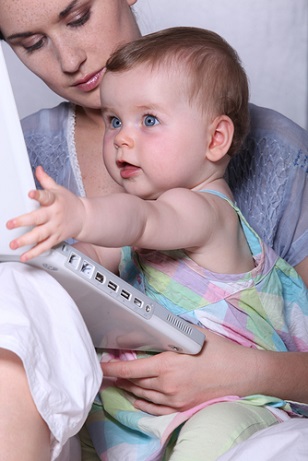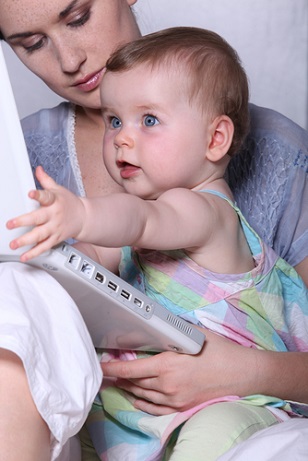Support justice-driven, accurate and transparent news — make a quick donation to Truthout today!
 Mother and baby with a laptop. via Shutterstock)” width=”308″ height=”461″ />(Photo: Mother and baby with a laptop via Shutterstock)The Pew report released recently finding that mothers are the primary or sole income earners in 40 percent of households with children emphasized the growth of their demographic group since 1960, when mothers were the breadwinners in only 11 percent of households. But as more American families rely on women’s earnings, concerns remain that public policy is not keeping pace with their evolving needs.
Mother and baby with a laptop. via Shutterstock)” width=”308″ height=”461″ />(Photo: Mother and baby with a laptop via Shutterstock)The Pew report released recently finding that mothers are the primary or sole income earners in 40 percent of households with children emphasized the growth of their demographic group since 1960, when mothers were the breadwinners in only 11 percent of households. But as more American families rely on women’s earnings, concerns remain that public policy is not keeping pace with their evolving needs.
The United States is one of the few industrialized nations that does not mandate paid parental leave, posing problems for all families and particularly those headed by single mothers, who were 67 percent of the breadwinners identified in the Pew report. According to Pew, their median income is $23,000 and they are more likely to be women of color.
Rep. Gwen Moore (D-Wisconsin) thinks policymakers must do more to help these women, including improving the level of child care available to low-income families. “It has really irked me that public policy, where women are single female heads of household, doesn’t consider the childrearing and childcare needs of single parents,” she told Truthout. Moore, who has spearheaded attempts to overhaul social welfare programs like Temporary Assistance for Needy Families (TANF), said TANF should expand the types of activities that are eligible for federal child care support, which is now limited to work-related activities, secondary education and community service, with some restrictions. “To say that you’re not eligible for childcare for activities other than working is state-sanctioned child abuse,” said Moore.
The Child Care and Development Block Grant (CCDBG), the primary federal grant program that provides child care assistance for families and funds childcare quality initiatives, has not been reauthorized since 1996. In a May statement, the Department of Health and Human Services said the administration is continuing to work with Congress toward reauthorization. At a Senate subcommittee hearing on the CCDBG last year, Sen. Richard Burr (R-North Carolina) voiced concern that “nearly 1.7 million children currently receiving subsidies are not receiving quality care and in some cases are in conditions unbefitting a federal taxpayer investment.”
Moore said greater accountability in the child support system is also needed to help lift these women and their children out of poverty. “We have a lot of mechanisms set up to guarantee that women are sanctioned for not working, but we don’t fund child support enforcement,” she said. In 2011, outstanding child support payments reached $100 billion owed to 37.5 million parents, according to the nonprofit organization Project Child Support. The Congresswoman said she has been working on the issue for a number of years with fellow Wisconsin Representative and House Budget Committee Chair Paul Ryan on a pass-through mechanism for child support checks to maximize the funds that go to the parent and minimize administrative fees and other deductions. “He said this year in the budget talks we’re going to finally have to get this done,” said Moore.
Meanwhile, bills like the Working Families Flexibility Act (HR1406) and the Balancing Act highlight continuing tensions among lawmakers about what defines family-friendly policy. HR1406 was introduced in April and sought to amend the Fair Labor Standards Act to allow employers to compensate employees for overtime with time off instead of pay. The bill was criticized for endangering workers’ rights, in part by allowing employers sole discretion in granting compensatory time; it died in the Senate. Retired Democratic Rep. Lynn Woolsey championed The Balancing Act, a comprehensive overhaul of family policy with provisions like mandated paid sick leave, state pilots to encourage telecommuting options, doubling the length of family medical leave and universal preschool. It has been introduced several times, including in the last Congress, but has never made it out of committee.
The Pew report showed opinions are divided regarding the increasing role of women in the workplace and the role of parents according to their gender. Just over half of respondents said children are better off if mothers stay home with them, while only 8 percent said children are better off if fathers stay home; 34 percent said kids are just as well off if mothers work while 76 percent said they are just as well off if fathers work.
Social pressures like these combine with other challenges for breadwinner moms. Working women face a persistent gendered wage gap, making on average about 70 cents for every dollar men earn, as well as a “second shift” at home documented by the Bureau of Labor and Statistics, whose survey last year found that while women work outside the home with increasing frequency, the amount of cooking, cleaning and other household tasks they perform has decreased only slightly.
Meanwhile, young women and men appear by at least one measure to have similar professional ambitions. The nonpartisan research center Families and Work Institute in 1992 began surveying young adults’ desire for jobs with greater responsibility. In 2008 for the first time, women’s interest in such work was only 3 percent lower than men’s while previous measures were between 7 and 10 percent lower.
Georgetown law professor Naomi Mezey thinks new family policies could help equalize workloads and opportunities for mothers and fathers. “We still have at this point a highly romantic, partly nostalgic, and partly fantasized idea about the importance of women being at home and being the primary caregiver,” said Mezey. “The fact that they’ve always had these responsibilities to care for children and family members makes their jobs more precarious.”
“In our culture we tend to focus on things like equal pay, and it’s much harder to think about how do we equalize men in the family?” she said, noting that some European countries have had success with mandating both maternal and paternal leave. “You require men to take a certain amount of paternal leave and it actually ends up having a virtuous circle: They’re home early, they’re engaged with the kid, and the more engagement they have, the more competent and self-confident they become in taking care of their children.” While Mezey acknowledges that may not be politically feasible in the United States today, she says ensuring men and women have generous parental leave is a good first step.
Kelly Sakai-O’Neill with the Families and Work Institute said changing the way Americans balance work and family goes beyond lawmaking. “It has to be holistic,” she said. “It cannot come just from the private sector. It cannot come just from the government. It cannot just be mandated or legislated. It also has to happen on a cultural level.”
Some cultural shifts appear to be underway. According to the Pew report, young adults are less likely than older people to see negative consequences in the trend that more mothers are heads of households and they are more likely to see positive effects.
A terrifying moment. We appeal for your support.
In the last weeks, we have witnessed an authoritarian assault on communities in Minnesota and across the nation.
The need for truthful, grassroots reporting is urgent at this cataclysmic historical moment. Yet, Trump-aligned billionaires and other allies have taken over many legacy media outlets — the culmination of a decades-long campaign to place control of the narrative into the hands of the political right.
We refuse to let Trump’s blatant propaganda machine go unchecked. Untethered to corporate ownership or advertisers, Truthout remains fearless in our reporting and our determination to use journalism as a tool for justice.
But we need your help just to fund our basic expenses. Over 80 percent of Truthout’s funding comes from small individual donations from our community of readers, and over a third of our total budget is supported by recurring monthly donors.
Truthout has launched a fundraiser to add 379 new monthly donors in the next 6 days. Whether you can make a small monthly donation or a larger one-time gift, Truthout only works with your support.
